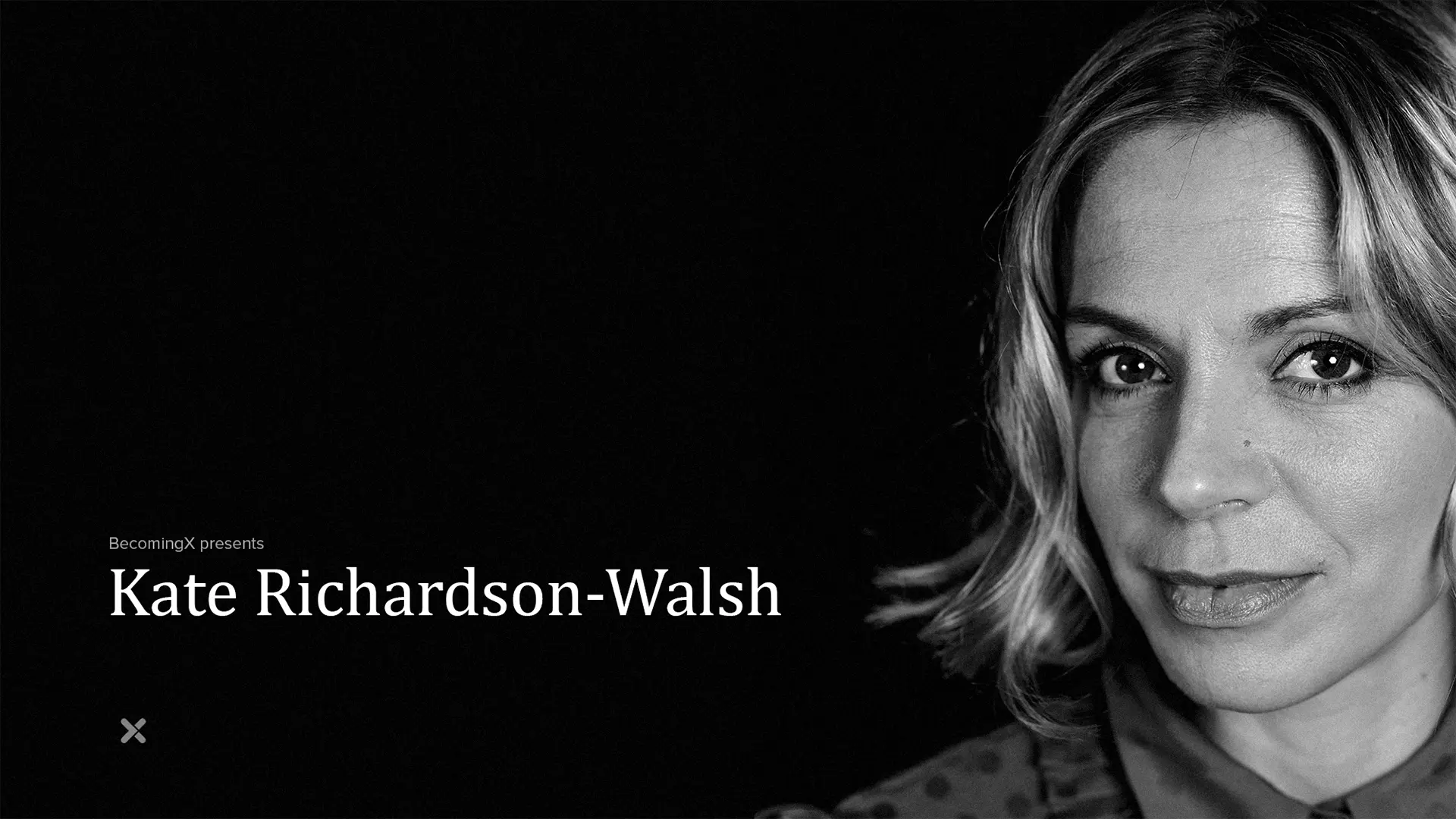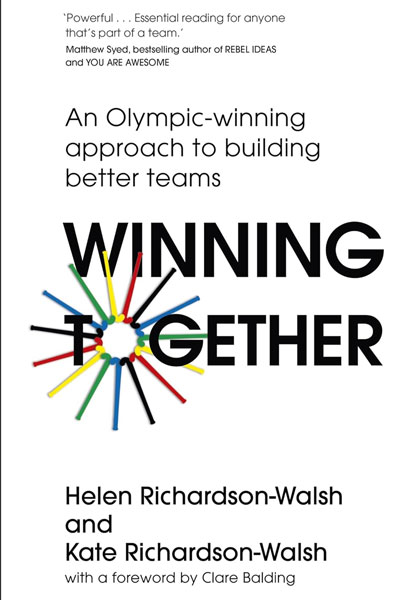

"When I looked down at that medal on that podium . . . It's a nod to that little girl to say, you know, 'you did it'".
Dragged around the sides of an 80s Stockport pitch to watch her mother play hockey was a young Kate Richardson-Walsh. A nervous and shy little girl; bullied for not fitting in and struggling in school. But when she picked up a stick herself for the first time, Kate knew it was the perfect challenge. She finally felt like she belonged. She was a part of a team. With the support from her PE teacher, she tried out for the local county team and was selected for the England U16 team at only 14.
Despite being a promising talent, Kate lost her way. Wanting to fit in, she surrounded herself with the wrong people. The following year, her name was absent from the list of players making the cut. But this was not where Kate’s story ended; this was the start. This was the moment Kate decided to go all-in. To be the best hockey player she could possibly be.
Channelling energy and inspiration from others, coupled with a healthy dose of anxiety and imposter syndrome, Kate started to carve her own path. Kate learned to love the discipline of training and was offered a spot on the Great Britain Women’s Team whilst in university studying to become a teacher. Kate rose to captaincy at the young age of 19, a position she held for the next 13 years. She became a student of the game and had an exceptional ability to read it. She genuinely cared about every player, using the raw emotions of her teammates as her driving force, her motivational tool, her learning process.
Kate possessed the unique ability to show vulnerability, admit mistakes and put person above results. Kate the individual, the hockey player and the captain were all morphed into one, encapsulating an unstoppable leadership approach that brought the Great Britain Women’s Hockey team a gold medal in the Rio 2016 Olympics. Not only was this an ode to all her hard work for the past 17 years, but also to the little girl who didn’t think she was particularly good at anything.
Kate Richardson-Walsh – video transcript
I grew up in Heaton Moor in Stockport. I really struggled at primary school. I was really poorly as a young girl, so I was five years old and I was off school a lot. I had not much weight on me because I couldn't eat very much, so I was a skinny little thing and I just stuck out. You know, when you stick out at school when you are young kids can be quite mean, and I got called all sorts of names.
My mum played hockey. And so I remember being dragged around the side of a hockey pitch, watching my mum. And I said, "I'm never going to play hockey, mum. I don't want to be like you." Really stubborn. And then went to secondary school, just my local state school. And hockey was one of the things we did in PE. Almost immediately as soon as I picked up a stick and started playing, I fell in love with it. I didn't take to it really quickly, but I enjoyed the challenge of it. My PE teacher Mrs. Kinder sent me to trials for my local county team.
It all kind of happened really quickly for me. And almost before I knew what was happening, I found myself being selected aged 14, for the England Under-16 team. Playing with girls who I genuinely believed were so far and away, better than me. I don't think I really had the opportunity to really think, do I want this? Am I good enough? Until, the year after that when I was dropped from England Under-16s.
I think as a result of wanting to fit in socially, so outside of hockey, I was hanging around with people that I probably shouldn't have been hanging around with. I was drinking and my friends were taking drugs. I remember so, so clearly in those days a letter would be sent out. And there was a list of names that were selected for the England Under-16s and my name wasn't on that list. And I remember, just that rush of emotion, embarrassment, sadness, complete devastation and just typical teenager, ran up upstairs, locked myself in the bathroom. And eventually I came out and my mum sat me down and the only thing that I really remember from that conversation was her saying to me, "What do you want to do about it, Kate?"
Hockey was somewhere that I fitted. That I could be comfortable in my own skin. And so I just set about making better choices. Went to a different college where none of my friends went. Got my A-levels so I could go to university where it was going to help me play hockey. I had to learn to love the discipline of training, and eating well and looking after myself. And then I went to John Moores University where I started to become a teacher. And then I got my call up to the England team, Senior England team. So I took that year off and went, went to Sydney Olympics.
Coming into that group of senior international players, as a teenager, was quite daunting. You know, these are women that I'd watched on TV play in the Olympics. Some of them had won Olympic bronze medal at the '92 Olympic games. And here was I just a little average Joe Kate, turning up.
2003, we were about to go and play in a Champions Trophy, which was top six teams in the world and our coach at the time, Trisha Heberle said, "Okay, we're going to vote for our captain’s group." And the coach came back with the vote count and said, "Okay, actually, I'm going to change this up. And I want one person to be captain. She's got an overwhelming vote from the group so I'm going to make Kate the captain." Which I was like, "What?" And I was really proud, hugely honoured. But I also felt a bit of a sham, I felt like I, bit of an impostor. I was really questioning whether this was the right thing for the group.
And, as I had done in all of my other aspects of my life up to that point, I decided, well, what I am going to do, I'm going to copy somebody else. The captain that I'd had just before the Sydney Olympics was Sue Chandler. I said okay, I'm going be like Sue. So I set about trying to be like her. So I would try and make big speeches and have a really great punchy quote for the huddles and I absolutely fell flat on my face because and I know now sitting here that we follow leaders that are authentic and genuine. And although I think they were following me, I guess there was probably a bit of, you know, she's not quite sure of who she is right now. And it was a really tempestuous time.
In 2003, I was made captain. In 2004, we failed to qualify for the Olympic Games as the British Women's team. Which had never been done before. So making history for all the wrong reasons. And for some of those women in that team that was their last opportunity to make their dreams come true. To go to the Olympic Games, represent their country, win an Olympic medal, and that had gone. I felt that sense of responsibility. I felt that weight was on me as a captain. That feeling from those women at that time, I locked it away inside. And vowed to use that as a driver, as a motivational tool. As a learning process to make sure that that never happened again.
By the time we got to Rio in 2016, as a group of women, we had been on an epic journey. Experienced London 2012 Olympics. Being on that podium, touching distance to that gold medal. Then experienced rock bottom mentally, physically, emotionally, as the England side finishing 11th out of 12 at the World Cup in 2014. Me personally having the hardest part in my career ever. Having to take time away from the sport. Starting to see a therapist. Really struggling with my mental health. Around 2014, the whole squad struggling, in many different ways.
To put together two weeks of exceptional teamwork. Eight games in 14 days back-to-back wins. Every day just picking ourselves up and going at it again. And just standing on that podium in the end holding that gold medal. Which, for me, for Helen, had spent 17 years trying to get our hands on. Every kind of experience, all the highs, all the lows, was in that moment. When I looked down at that medal on that podium and I think, you know, as a little girl, that absolutely wasn't for me. That was something that happened to other people. It's a nod to that little girl to say, you know you did it. And all of those difficult moments, the bullying at school, the doubting yourself, having no confidence. You know you, came out of that and you're standing here, now at the top of the world. So, yeah, it meant a lot.
END CARD
Kate Richardson-Walsh became the most capped female player in British hockey history with 375 performances.
She captained the team for a record 13 years and won 19 major medals.
In 2016, she captained the Great Britain hockey team to Olympic gold in Rio de Janeiro, ending her 17 year quest to lead her country to victory in the sport's greatest tournament.
 Winning Together: An Olympic-Winning Approach to Building Better Teams
Winning Together: An Olympic-Winning Approach to Building Better Teams